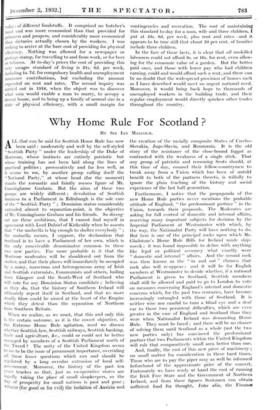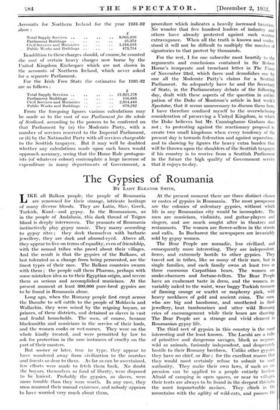Why Home Rule For Scotland ?
BY SIR lax MALCOLM.
ALL that can be said for Scottish Home Rule has now been said : moderately and well by the self-styled " Scottish Party " under the leadership of the Duke of Montrose, whose instincts are entirely patriotic but whose training has not been laid along the lines of practical politics ; provocatively and far less well, as it seems to me, by another group calling itself the " National Party," at whose head (for the moment) stands the romantic and faintly rococo figure of Mr. Cunninghame Graham. But the aims of these two groups are widely different ; devolution of Scottish business to a Parliament in Edinburgh is the sole care of the " Scottish Party " ; Dominion status considerably extended almost to separation-point, is the objective of Mr. Cunninghame Graham and his friends. So diverg- ent are these ambitions, that I cannot find myself in agreement with Lord Dalziel of Kirkcaldy when he asserts that " the umbrella is big enough to shelter everybody " ; the umbrella means; I suppose, the declaration that Scotland is to have a Parliament of her own, which is the only conceivable denominator common to these two new parties. Far more probable is it that the Montrose. moderates will be shouldered out from the shelter, and that their places will immediately be occupied by a noisy, numerous and heterogeneous army of Irish and Scottish extremists, Communists and others, hailing from Glasgow and the South-West of Scotland who will vote for any Dominion Status candidate ; believing as they do, that the history of Southern Ireland will ultimately' repeat itself in Scotland, and that no more deadly blow could be aimed at the heart of the Empire which they detest than the separation of Northern from Southern Britain.
When we realize, as we must, that this and only this is the certain outcome, as it is the covert objective, of the Extreme Home Rule agitation, need we discuss whether Scottish law, Scottish railways, Scottish banking, trade and agriculture, &c., could or could not be better managed 'by members of a Scottish Parliament north of the Tweed ? The unity of the United Kingdom seems to me to be the issue of paramount importance, overriding all these lesser questions which can and should be regulated by a long overdue extension of local self- government. Moreover, the history of the past ten years teaches us that, just as co-operative stores are rapidly taking the place of small shopkeepers, so the day of prosperity for small nations is past and gone ; Witness (for good or for evil) the isolation of Austria and the creation of the racially composite States of Czecho- Slovakia, Jugo-Slavia, and Roumania. It is the old story of the resistance of the close-bound faggot as contrasted with the weakness of a single stick. That any group of patriotic and reasoning Scots should, at this time of day, counsel their fellow-countrymen to break away from a Union which has been of untold benefit to both of the partners thereto, is wilfully to ignore the plain teaching of the history and social experience of the last half generation.
Furthermore, I notice that the propaganda of the new Home Rule parties never mentions the probable attitude of England, " the predominant partner " in the Union, towards their proposals. The Moderates arc asking for full control of domestic and internal affairs, reserving many important subjects for decision by the Imperial Parliament at Westminster with which, by the way, the Nationalist Party will have nothing to do. But here is one of the principal rocks upon which Mr. Gladstone's Home Rule Bills for Ireland made ship- wreck ; it was found impossible to define with anything like legal or political accuracy what exactly were " domestic and internal " affairs. And the second rock was then known as the " in and out " clauses; that rock also will re-appear ; and it will be for English members at Westminster to decide whether, if a national Parliament is given to Scotland, Scottish members shall still be allowed and paid to go to London to vote on measures concerning England's internal and domestic concerns which, for the past two centuries, have become increasingly entangled with those of Scotland. It is neither wise nor candid to turn a blind cyc and a deaf ear to those two persistent difficulties, which arc even greater in the ease of England and Scotland than they were when Nationalist Ireland was demanding Home Rule. They must be faced ; and there will he no chance of solving them until Scotland as a whole (not the two new parties only) has convinced the predominant partner that two Parliaments within the United Kingdom will rule that comparatively small area better than one. And, finally, the cost of this new piece of machinery ; no small matter for consideration in these hard times. Those who are to pay the piper may as well be informed beforehand of the approximate price of the concert, Fortunately we have ready at hand the cost of running the Irish Free State and the Government of Northern Ireland, and from these figures Scotsmen can obtain sufficient' food for thought. Inter alia, the Finance Accounts for Northern Ireland for the year 1931-32 Show :
Total Supply Services .. Parliament Buildings .. Civil Services and Ministries . .Public Works and Buildings
In addition to these charges should, of course, be counted the cost of certain heavy charges now borne by the United Kingdom Exchequer which are not shown in the accounts of Northern Ireland, which never asked for a separate Parliament.
For the Irish Free State the estimates for 1931-32 are as follows :
£ Total Supply Services .. 21,921,578 Parliament Buildings 116,885 Civil Services and Ministries .. 2,914,446 Public Works and Buildings .. .. 678,282
From the foregoing figures various calculations may be made as to the cost of one Parliament for the ,whole of Scotland, according to the powers to be conferred on that Parliament by (a) the Moderate Party, with a number of services reserved to the Imperial Parliament, or (b) by the Nationalist Party with all services chargeable to the Scottish taxpayer. But it may well be doubted whether any calculations made upon such bases would approach accuracy, seeing that the Home Rule protagon- ists (of whatever colour) contemplate a large increase of expenditure in many departments of Government, a
.. 9,065,850 25,372 .. 1,244,618 .. 473,754
• •
procedure which indicates a. heavily increased. taxation; No wonder that five hundred leaders of industry and others have already protested against such :wanton extravagance. When all the truth is known and. under. stood it will not be difficult to multiply the number of signatories to that protest by thousands.
For the rest, I for one subscribe most heartily to the arguments and conclusions contained in Sir Robed Horne's temperate and trenchant letter in The Times of November 23rd, which faces 'and demolishes one by one all the Moderate Party's claims for a Scottish Parliament. So adequately have her and the Secretary of State, in the Parliamentary debate of the following day, dealt with these aspects of the question in antici- pation of the Duke of Montrose's article in last week's Spectator, that it seems unnecessary to discuss them here. I have therefore confined myself to the overwhelming sonsideration of preserving a United Kingdom, in which the Duke believes but Mr. Cunninghame Graham does not ; to protesting against the reactionary proposal to create two -small kingdoms when every tendency of the present day is towards federation and against separation : and to showing by figures the heavy extra burden that will be thrown upon the shoulders of the Scottish taxpayer if his country is to receive from a Scottish Parliament in the future the high quality of Government service that it enjoys to-day.











































 Previous page
Previous page